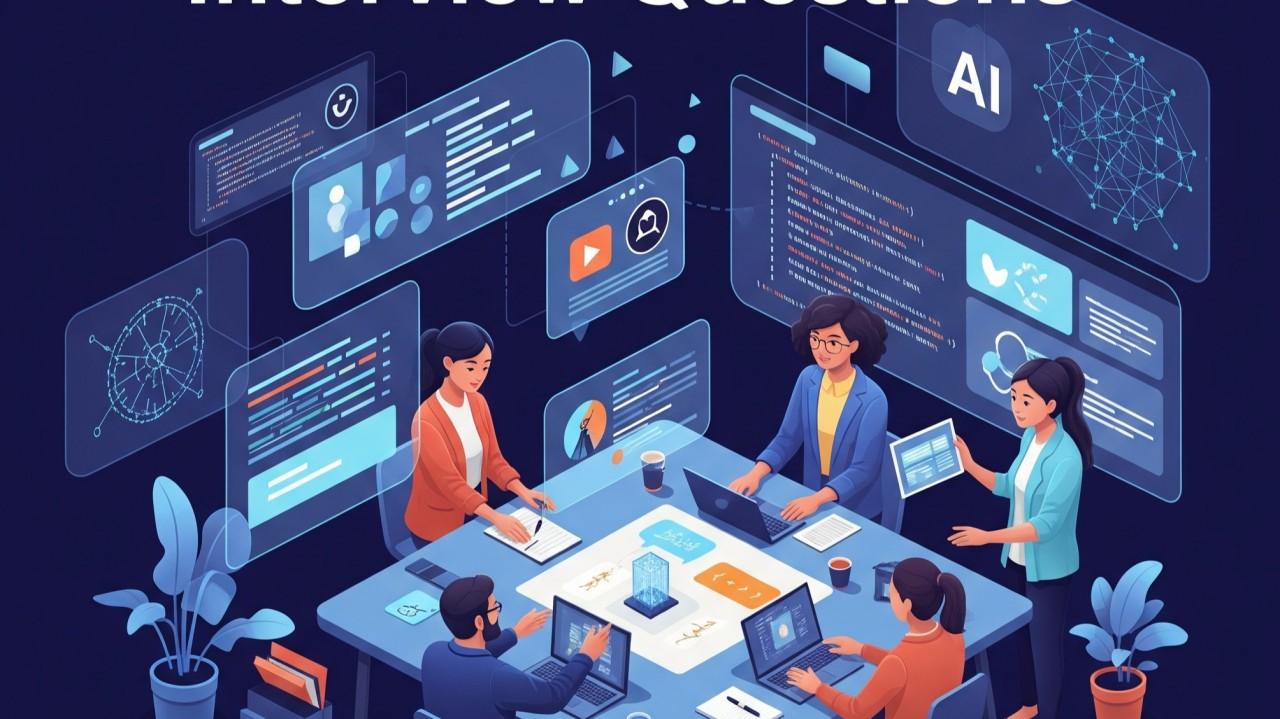As artificial intelligence (AI) and machine learning (ML) rapidly transform industries, competition for coveted roles at leading tech companies is fierce. Interviews at top firms like Google, Amazon, and Meta assess more than just your technical prowess—they test your ability to handle real-world challenges, communicate effectively, and work well with others. This blog will explore the key areas that candidates need to master to stand out in an AI/ML interview at FAANG.
1. Show You’re a
Python Ninja
If there’s one programming language synonymous
with machine learning, it’s Python. Interviewers are looking for candidates who aren’t just comfortable with
Python but can wield it with the skill of a seasoned expert. Whether it's building a neural network,
optimizing a K-Means algorithm, or scraping data, your Python expertise will be tested.
Why Python is
Essential
Python’s flexibility, simplicity, and extensive
library support make it the go-to language for AI and ML development. Libraries like TensorFlow, Keras,
Scikit-learn, and PyTorch have cemented Python as a powerhouse for building everything from deep learning
models to simple decision trees
How to Demonstrate
Expertise
The key to impressing in a coding interview is
not just getting the right answer but writing clean, efficient code. Companies often ask candidates to
implement ML algorithms from scratch using Python. For example, you might be tasked with coding a Support
Vector Machine (SVM) or building a Gradient Boosted Tree.Pay close attention to optimizing for both
readability and performance, and be prepared to explain your code in detail.
Common Python
Interview Questions
Algorithm
Implementation: Write a Random Forest or Gradient Boosting algorithm from
scratch.
Data
Manipulation: How would you clean and preprocess a large dataset? Implement functions
using libraries like Pandas and NumPy.
Optimization: Optimize a neural network model for speed and
performance on large datasets.
2. Make Machine
Learning Sound Simple
In AI/ML roles, you'll need to communicate
complex ideas to both technical and non-technical stakeholders. Whether you're explaining a deep learning
model to your peers or breaking down the basics of logistic regression for a product manager, your ability
to simplify complexity will be key.
The Importance of
Clear Communication
Clear communication is often the difference
between a good engineer and a great one. You may know all the ins and outs of the bias-variance trade-off or
convolutional neural networks, but can you explain these concepts in a way that non-experts can understand?
Interviewers look for candidates who can make these topics accessible.
Key Concepts to
Master
During the interview, you might be asked to
explain foundational ML concepts like:
Bias-Variance
Trade-Off: Balancing model complexity with performance.
Supervised vs.
Unsupervised Learning: Defining the key differences and when to use each.
Overfitting and
Regularization: Discussing techniques like L1 and L2 regularization to prevent
overfitting.
Common
Questions
Explain
cross-validation: Why is it important in model evaluation?
What is your
favorite ML algorithm?: Describe it as though you're teaching a beginner.
Explain the
difference between KNN and K-Means: This will test your ability to compare algorithms
and simplify differences.
3. Master the Art
of Navigating Ambiguity
ML problems often come with incomplete data and
undefined solutions. Interviewers want to know that you can tackle uncertainty head-on. Can you work with
limited information, make assumptions, and still devise an effective solution?
Why Ambiguity is a
Key Skill
Real-world problems are rarely as clear-cut as
those in textbooks. You may be asked to build a fraud detection model without labeled data or optimize an
algorithm for a scenario with unclear business goals. The ability to think critically and make educated
assumptions will set you apart from other candidates.
How to Approach
Ambiguous Problems
Ask Clarifying
Questions: Never assume you have all the information upfront. Clarify objectives and
gather more context.
Define
Assumptions: When details are missing, make reasonable assumptions and be ready to
justify them.
Break It
Down: Divide the problem into smaller, manageable parts and tackle each piece
methodically.
Common Ambiguous
Questions
Design a
recommendation system: Explain how you’d handle incomplete user data or shifting
business requirements.
Build a
real-time translation system: How would you design it to scale globally?
How would you
solve a problem with unstructured data?: This tests your ability to innovate and
improvise.
4. Prove You’ve
Delivered Results That Matter
Top companies don’t just want theoretical
knowledge; they want to see tangible outcomes from your past work. Have you deployed a model that improved
business performance? Have you optimized a system that saved time or reduced costs? Your ability to
demonstrate real-world impact will be critical.
Why Impact
Matters
AI/ML work can have a significant business
impact, whether it’s improving product recommendations, speeding up logistics, or reducing fraud. When
interviewers ask about your past projects, they’re looking for evidence that you’ve made a difference and
that you can replicate those results at their company.
How to Showcase
Your Success
Use the STAR
Method: Structure your answers using Situation, Task, Action, Result. Be specific about
the challenge, what you did to solve it, and the measurable impact.
Quantify Your
Results: Metrics matter. Did you reduce false positives by 10%? Improve model accuracy
by 15%? These numbers help interviewers understand your contribution.
Examples of
Impact
Improved Model
Performance: Share examples where you optimized a machine learning model for better
accuracy or efficiency.
Business Use
Cases: Discuss a project where your work led to improved customer experience or
revenue.
5. Show You’re a
Team Player, Not a Lone Wolf
Machine learning projects are collaborative by
nature. You’ll be working with data engineers, product managers, and other stakeholders, so companies are
keen to know whether you’ll be a positive addition to the team. They want someone who’s not just brilliant,
but also easy to work with.
The Importance of
Soft Skills
While technical chops are essential, being able
to collaborate, handle feedback, and communicate across teams is equally important. Companies value
engineers who can integrate well into their existing culture and are easy to get along with.
How to Demonstrate
You’re a Team Player
Share
Examples: Talk about times when you collaborated across teams or mentored junior
colleagues.
Handle
Behavioral Questions with the STAR Method: When asked about conflict resolution or
teamwork, structure your answers to showcase your collaboration skills.
Emphasize
Empathy and Adaptability: These soft skills are increasingly valued in today’s
workplace.
Common Behavioral
Questions
Tell me about a
time you disagreed with a team member: How did you resolve it?
Describe a time
you received feedback: How did you handle it and improve?
5. How
InterviewNode Can Help You Ace Your AI/ML Interview
At InterviewNode, we specialize
in helping software engineers prepare for their most challenging AI and ML interviews at top-tier tech
companies. Our program is designed to give you an edge by focusing on the five key areas mentioned in this
blog, and providing you with hands-on support to ensure success. Here's how we can help:
1. Master Python
Like a Pro
InterviewNode offers coding challenges and mock
interviews specifically geared toward Python. Our platform simulates real interview scenarios where you'll
be asked to implement algorithms, optimize code, and solve complex problems—all using Python. With
personalized feedback from experienced AI/ML professionals, you'll become a Python expert in no time.
2. Demystify
Machine Learning Concepts
We know that explaining complex ML concepts in
simple terms is a challenge. Our program includes one-on-one coaching sessions where you'll practice
explaining algorithms like Random Forest, Neural Networks, and SVMs to both technical and non-technical
audiences. We help you refine your communication skills so you can confidently navigate questions on
bias-variance trade-offs, overfitting, and more.
3. Handle
Ambiguity with Confidence
Ambiguity in interviews can be overwhelming, but
at InterviewNode, we guide you through strategies for tackling open-ended problems. Our mentors walk you
through real-world, ambiguous ML cases and help you develop a structured approach to asking the right
questions, making assumptions, and solving problems efficiently.
4. Showcase Your
Impact
We help you identify and present your most
impactful projects in a way that resonates with interviewers. Using the STAR method, our team will work with
you to craft compelling stories that showcase your ability to deliver tangible results, whether through
improving model accuracy or optimizing algorithms for performance.
5. Become a
Standout Team Player
Through mock behavioral interviews, we prepare
you to answer questions about teamwork, leadership, and conflict resolution. We also focus on how to
communicate empathy, adaptability, and collaboration—qualities that are critical in today’s
workplace.
With InterviewNode, you don't
just prepare—you prepare smarter. By honing both your technical and interpersonal skills, you'll walk into
your next AI/ML interview feeling confident and ready to impress.






